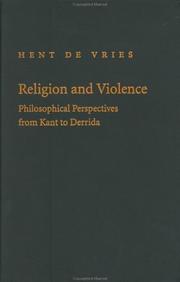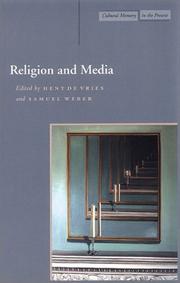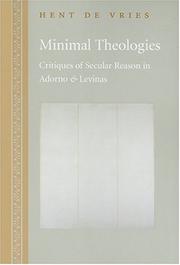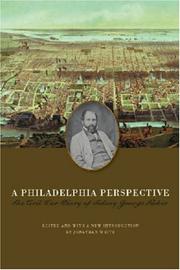| Listing 1 - 10 of 10 |
Sort by
|

ISBN: 0801867673 0801867681 0801875234 9780801875236 9780801867675 9780801867682 Year: 2002 Publisher: London : Johns Hopkins University Press,
Abstract | Keywords | Export | Availability | Bookmark
 Loading...
Loading...Choose an application
- Reference Manager
- EndNote
- RefWorks (Direct export to RefWorks)
Filosofie en godsdienst --- Godsdienst en filosofie --- Philosophie et religion --- Philosophy and religion --- Religion and philosophy --- Religion et philosophie --- Religious studies --- Violence --- Religious aspects --- Philosophy and religion. --- Religious aspects. --- Violence (in religion, folklore, etc.) --- Christianity and philosophy --- Religion --- Moral and religious aspects --- Violence - Religious aspects
Book
ISBN: 1421437392 1421437414 1421437406 Year: 2019 Publisher: Johns Hopkins University Press
Abstract | Keywords | Export | Availability | Bookmark
 Loading...
Loading...Choose an application
- Reference Manager
- EndNote
- RefWorks (Direct export to RefWorks)
Originally published in 1999. If religion once seemed to have played out its role in the intellectual and political history of Western secular modernity, it has now returned with a vengeance. In Philosophy and the Turn to Religion, Hent de Vries argues that a turn to religion discernible in recent philosophy anticipates and accompanies this development in the contemporary world. Though the book reaches back to Immanuel Kant, Martin Heidegger, and earlier, it takes its inspiration from the tradition of French phenomenology, notably Emmanuel Levinas, Jean-Luc Marion, and, especially, Jacques Derrida. Tracing how Derrida probes the discourse on religion, its metaphysical presuppositions, and its transformations, de Vries shows how this author consistently foregrounds the unexpected alliances between a radical interrogation of the history of Western philosophy and the religious inheritance from which that philosophy has increasingly sought to set itself apart.De Vries goes beyond formal analogies between the textual practices of deconstruction and so-called negative theology to address the necessity for a philosophical thinking that situates itself at once close to and at the farthest remove from traditional manifestations of the religious and the theological. This paradox is captured in the phrase adieu (à dieu), borrowed from Levinas, which signals at once a turn toward and a leave-taking from God—and which also gestures toward and departs from the other of this divine other, the possibility of radical evil. Only by confronting such uncanny and difficult figures, de Vries claims, can one begin to think and act upon the ethical and political imperatives of our day.
Religionsphilosophie. --- Godsdienst. --- Filosofie. --- Philosophy and religion. --- Philosophie et religion --- Philosophy and religion --- Histoire. --- History. --- Christianity and philosophy --- Religion and philosophy --- Religion --- Philosophy of religion
Book
ISBN: 1421437481 1421437503 142143749X Year: 2019 Publisher: Johns Hopkins University Press
Abstract | Keywords | Export | Availability | Bookmark
 Loading...
Loading...Choose an application
- Reference Manager
- EndNote
- RefWorks (Direct export to RefWorks)
What, at this historical moment "after Auschwitz," still remains of the questions traditionally asked by theology? What now is theology's minimal degree? This magisterial study, the first extended comparison of the writings of Theodor W. Adorno and Emmanuel Levinas, explores remnants and echoes of religious forms in these thinkers' critiques of secular reason, finding in the work of both a "theology in pianissimo" constituted by the trace of a transcendent other. The author analyzes, systematizes, and formalizes this idea of an other of reason. In addition, he frames these thinkers' innovative projects within the arguments of such intellectual heirs as J?rgen Habermas and Jacques Derrida, defending their work against later accusations of "performative contradiction" (by Habermas) or "empiricism" (by Derrida) and in the process casting important new light on those later writers as well. Attentive to rhetorical and rational features of Adorno's and Levinas's texts, his investigations of the concepts of history, subjectivity, and language in their writings provide a radical interpretation of their paradoxical modes of thought and reveal remarkable and hitherto unsuspected parallels between their philosophical methods, parallels that amount to a plausible way of overcoming certain impasses in contemporary philosophical thinking. In Adorno, this takes the form of a dialectical critique of dialectics in Levinas, that of a phenomenological critique of phenomenology, each of which sheds new light on ancient and modern questions of metaphysics, ethics, and aesthetics. For the English-language publication, the author has extensively revised and updated the prize-winning German version.
Godsdienstfilosofie. --- Deconstructie. --- Dialectiek. --- Rationalisme. --- Transcendence (Philosophy) --- Rationalism. --- Philosophical theology. --- Dialectic. --- Deconstruction. --- L©evinas, Emmanuel --- Adorno, Theodor W., --- L©evinas, Emmanuel. --- Theology, Philosophical --- Philosophy and religion --- Theology, Doctrinal --- Knowledge, Theory of --- Religion --- Belief and doubt --- Deism --- Free thought --- Realism --- Criticism --- Semiotics and literature --- Polarity --- Polarity (Philosophy) --- Philosophy --- Phenomenology & Existentialism
Book
ISBN: 9782130815105 2130815103 Year: 2019 Publisher: Paris: PUF,
Abstract | Keywords | Export | Availability | Bookmark
 Loading...
Loading...Choose an application
- Reference Manager
- EndNote
- RefWorks (Direct export to RefWorks)
Le miracle est un événement qui semble excéder ses causes. Frappant, imprévu, il remet en question les limites de ce qui est censé être possible. Mais n’est-ce pas ce qui caractérise les événements authentiques, dans les domaines historiques et politiques, éthiques et artistiques, dans les vies et les amours individuelles ? En quel sens pouvons-nous dire que les miracles, et plus précisément la pensée du miracle, peuvent constituer une ressource conceptuelle et une richesse sur le plan pratique, permettant de répondre à cette question résolument philosophique ? Comment penser le miracle en tenant compte des critiques anciennes et modernes ? De saint Augustin à Wittgenstein, la question n’a cessé d’être brûlante pour les philosophes. Dans une série de « méditations métaphysiques », Hent de Vries explore le concept de miracle et la croyance au miracle. Porté par une démarche philosophique ouverte, il convie à l’étude d’une métaphysique des miracles et du miracle de la métaphysique, fondés sur l’étonnement et l’émerveillement.
Metaphysics. --- Miracles (surnaturel). --- Miracles. --- Métaphysique. --- metaphysics. --- miracles.
Book
ISBN: 0804788383 9780804788380 9780804785211 080478521X 9780804795258 0804795258 Year: 2014 Publisher: Stanford, California : Stanford University Press,
Abstract | Keywords | Export | Availability | Bookmark
 Loading...
Loading...Choose an application
- Reference Manager
- EndNote
- RefWorks (Direct export to RefWorks)
This work revisits the famous question posed by critics from Sainte-Beuve and T.S. Eliot to J.M. Coetzee to ask how classics emanate from postcolonial histories and societies. Exploring definitive trends in 20th and 21st century English and Anglophone literature, Mukherjee demonstrates the relevance of the question of the classic for the global politics of identifying and perpetuating so-called core texts.
English literature --- Postcolonialism in literature. --- Canon (Literature) --- Criticism. --- Criticism --- Evaluation of literature --- Literary criticism --- Literature --- Rhetoric --- Aesthetics --- Classics, Literary --- Literary canon --- Literary classics --- Best books --- British literature --- Inklings (Group of writers) --- Nonsense Club (Group of writers) --- Order of the Fancy (Group of writers) --- History and criticism. --- Technique --- Evaluation --- History and criticism --- Postcolonialism in literature --- anno 1900-1999 --- anno 2000-2099 --- Canon (Literature). --- Englisch. --- English literature. --- Kanon. --- Postkoloniale Literatur. --- 1900-2099.

ISBN: 9780804734974 0804734976 0804734968 Year: 2001 Publisher: Stanford (Calif.): Stanford university press,
Abstract | Keywords | Export | Availability | Bookmark
 Loading...
Loading...Choose an application
- Reference Manager
- EndNote
- RefWorks (Direct export to RefWorks)
Mass media --- Religious aspects --- Religious aspects. --- Mass media - Religious aspects --- #SBIB:309H525 --- #SBIB:316.331H537 --- #SBIB:39A8 --- 291.4 --- 081 Godsdienst --- 690 Media, mediarecht --- #SBIB:316.331H340 --- 291.4 Godsdienstwetenschap: religieus leven; ascese; vroomheid; mystiek --- Godsdienstwetenschap: religieus leven; ascese; vroomheid; mystiek --- Sociologie van de audiovisuele boodschap --- Godsdienstige praktijken: massamedia --- Antropologie: linguïstiek, audiovisuele cultuur, antropologie van media en representatie --- Godsdienst en cultuur: algemeen --- Moral and religious aspects

ISBN: 0801880173 0801880165 9780801880179 Year: 2005 Publisher: Baltimore (Md.): Johns Hopkins University press,
Abstract | Keywords | Export | Availability | Bookmark
 Loading...
Loading...Choose an application
- Reference Manager
- EndNote
- RefWorks (Direct export to RefWorks)
What, at this historical moment "after Auschwitz," still remains of the questions traditionally asked by theology? What now is theology's minimal degree? This magisterial study, the first extended comparison of the writings of Theodor W. Adorno and Emmanuel Levinas, explores remnants and echoes of religious forms in these thinkers' critiques of secular reason, finding in the work of both a "theology in pianissimo" constituted by the trace of a transcendent other. The author analyzes, systematizes, and formalizes this idea of an other of reason. In addition, he frames these thinkers' innovative projects within the arguments of such intellectual heirs as Jurgen Habermas and Jacques Derrida, defending their work against later accusations of "performative contradiction" (by Habermas) or "empiricism" (by Derrida) and in the process casting important new light on those later writers as well. Attentive to rhetorical and rational features of Adorno's and Levinas's texts, his investigations of the concepts of history, subjectivity, and language in their writings provide a radical interpretation of their paradoxical modes of thought and reveal remarkable and hitherto unsuspected parallels between their philosophical methods, parallels that amount to a plausible way of overcoming certain impasses in contemporary philosophical thinking. In Adorno, this takes the form of a dialectical critique of dialectics; in Levinas, that of a phenomenological critique of phenomenology, each of which sheds new light on ancient and modern questions of metaphysics, ethics, and aesthetics. For the English-language publication, the author has extensively revised and updated the prize-winning German version.
Deconstruction. --- Dialectic. --- Philosophical theology. --- Rationalism. --- Transcendence (Philosophy) --- Transcendence (Philosophy). --- Deconstruction --- Dialectic --- Philosophical theology --- Rationalism --- Philosophy --- Knowledge, Theory of --- Religion --- Belief and doubt --- Deism --- Free thought --- Realism --- Theology, Philosophical --- Philosophy and religion --- Theology, Doctrinal --- Polarity --- Polarity (Philosophy) --- Criticism --- Semiotics and literature --- Adorno, Theodor W., --- Lévinas, Emmanuel. --- Wiesengrund, Theodor, --- Wiesengrund-Adorno, Theodor, --- Adorno, Teodor V., --- Adorŭno, --- אדורנו, תאודור --- אדורנו, ת. ו. --- Adorno, Th. W. --- Lévinas, Emmanuel. --- Lévinas, E. --- Leṿinas, ʻImanuʼel --- Levinas, Emani︠u︡el --- לוינס׳ עמנואל --- לוינס, עמנואל --- Līfīnās, Īmānwāl --- ليفيناس، إيمانوال --- Adorno, Theodor W. --- Lévinas, Emmanuel --- Adorno, Theodor W, - 1903-1969 --- Lévinas, Emmanuel --- Adorno, Theodor Wiesengrund, 1903-1969 --- Levinas, Emmanuel, 1906-1995

ISBN: 0823227243 082322726X 0823227286 0823259986 Year: 2008 Publisher: Fordham University Press
Abstract | Keywords | Export | Availability | Bookmark
 Loading...
Loading...Choose an application
- Reference Manager
- EndNote
- RefWorks (Direct export to RefWorks)
Book
ISBN: 9789004184961 9004184961 9786612952746 900418497X 1282952749 9789004184978 9781282952744 Year: 2010 Volume: 188 Publisher: Leiden ; Boston : Brill,
Abstract | Keywords | Export | Availability | Bookmark
 Loading...
Loading...Choose an application
- Reference Manager
- EndNote
- RefWorks (Direct export to RefWorks)
How the West Was Won contains articles in three main areas of the humanities. It focuses on various aspects of literary imagination, with essays ranging from Petrarch to Voltaire; on the canon, with essays on western history as one of shifting cultural horizons and ideals, and including censorship; and on the Christian Middle Ages, when an interesting combination of religion and culture stimulated the monastic and intellectual experiments of Anselm of Canterbury and Peter Abelard. The volume is held together by the method of persistent questioning, in the tradition of the western church father and icon of the self Augustine, to discover what the values are that drive the culture of the West: where do they come from and what is their future? This volume is a Festschrift for Burcht Pranger of the University of Amsterdam.
History of civilization --- Literature --- anno 500-1499 --- Western world --- Canon (Literature) --- Christian literature. --- Christianity and literature. --- Literature, Medieval. --- Europe --- Intellectual life. --- Canon (Literature). --- Europe -- Intellectual life. --- Christian literature --- Christianity and literature --- Literature, Medieval --- Religion --- Philosophy & Religion --- Christianity --- European literature --- Medieval literature --- Christian writings --- Religious literature --- Literature and Christianity --- Classics, Literary --- Literary canon --- Literary classics --- Best books --- Criticism --- History and criticism
Book
ISBN: 0190254084 0190254092 0190254106 0190254114 Year: 2015 Publisher: New York : Oxford University Press,
Abstract | Keywords | Export | Availability | Bookmark
 Loading...
Loading...Choose an application
- Reference Manager
- EndNote
- RefWorks (Direct export to RefWorks)
Eric Santner offers a radically new interpretation of Marx's labour theory of value as one concerned with the afterlife of political theology in secular modernity. What Marx characterised as the dual character of the labour embodied in the commodity, he argues, is the doctrine of the King's Two Bodies transferred from the political theology of sovereignty to the realm of political economy. This genealogy, leading from the fetishism of the royal body to the fetishism of the commodity, also suggests a new understanding of the irrational core at the centre of economic busyness today, its 24/7 pace.
Political theology. --- Collectivism. --- Kings and rulers --- Philosophy.
| Listing 1 - 10 of 10 |
Sort by
|

 Search
Search Feedback
Feedback About UniCat
About UniCat  Help
Help News
News